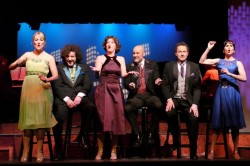Filichia Features: Side by Side – and then by Eight Others
Filichia Features: Side by Side – and then by Eight Others
I’m glad to be back in my hometown of Arlington, Massachusetts to see Side By Side By Sondheim at the local community theater.
Granted, you may giggle a bit when you hear the official name of the place. Can’t you just tell that “Arlington Friends of the Drama” was an outfit formed many moons ago? I picture elegant ladies at a ‘20s garden party using their white-gloved hands to pass around their cucumber sandwiches when suddenly someone – probably the dowager wearing the largest flowered hat -- said, “Why don’t we start a little theater?”
Ah, but the results speak for themselves. Although Jocelyn Hesse will soon be singing “I’m Still Here” as a tribute to resiliency, what’s really remarkable is that the Arlington Friends of the Drama is still here after 90 years – and has been ensconced in this former church for about 80 of them. The troupe can boast that Side By Side By Sondheim is its 424th production. Or to put it another way: “The Friends,” as it’s chummily known around town, was already well-established by the time that Sondheim was born in 1930.
All right, but the name “Stephen Sondheim” scares casual theatergoers more than beach readers fear Ulysses. Those who have traversed here this Sunday afternoon may only be familiar with the esteemed composer-lyricist’s “Send in the Clowns” or his lyrics to West Side Story and Gypsy. How will they react to the delectable-if-difficult songs for which he mostly wrote music and lyrics between 1962 and 1976? (That’s as far as this show goes in Sondheim’s career, for 1976 was the year when Side By Side By Sondheim debuted in London.)

The audience does just fine, thank you. For one thing, the show doesn’t immediately challenge, but opens with the happy-go-lucky “Comedy Tonight” from A Funny Thing Happened On The Way To The Forum. It was an ideal opening number for that hit musical, so it certainly will suffice for this one.
What soon follows, however, is “You Must Meet My Wife,” in which a married man is praising his newlywed to an old love he’s hoping to seduce; “Barcelona,” which shows one of life’s great difficulties: how awkward two relative strangers are the morning after a one-night stand; and “We’re Gonna Be All Right,” a rare Stephen Sondheim-Richard Rodgers collaboration that details many of the rigors of marriage and divorce.
Actually, because many of the songs deal with wedlock (accent on the second syllable), they score here among the suburban husbands and wives. Haven’t you noticed that whenever a joke about the difficulties of marriage surfaces in any play or film, most people in the audience laugh knowingly from sheer experience? SIDE BY SIDE BY SONDHEIM offers the opportunity for plenty of these chuckles and outright belly laughs.
So if you’ve feared offering your audience unfamiliar songs from Company, Follies, A Little Night Music, Pacific Overtures and Anyone Can Whistle, take a tip from a song from the last-named: “Come on! Be brave!” The Friends and director Joe Stallone were certainly brave in choosing the show, and now they were seeing “Everybody rise!” (as the line in “The Ladies Who Lunch” goes) to the occasion.

All right, but what about the performers? Aren’t Sondheim’s tricky rhythms, frequent key changes and tongue-torturing lyrics too difficult for the average community theater actor and actress? Although the original London and Broadway productions sported mere casts of four, MTI allows as many as 10 performers to do the show. Stallone has decided to embrace the latitude by offering not only three men and three women, but also a male and female narrator and two guest artists that we’ll get to later.
It’s a good idea. Having more bodies on stage divides the work among the performers and allows them that much more time to conquer fewer songs. This also gives a director more leeway in finding the right soprano to maneuver the high notes in the verse of “Getting Married Today” as well as discovering a woman who can sing the lickety-split lyrics that permeate the body of the song. Better still, having six people join in on “Marry Me a Little” allows them to harmonize beautifully, as the cast does here.
Stallone doesn’t have songs originally sung by women always sung by his three female cast members. Thus “I Remember Sky,” originally performed by Charmian (Liesl in The Sound of Music) Carr in Evening Primrose, goes to David Warnock. Considering that the song tells of a person who’s been confined to a department store almost all life long, a member of either sex can wistfully muse on the singular memory of having seen the clear blue sky before it was taken away.

Warnock also joins Kathy Dalton and Anne McCoy on “You Could Drive a Person Crazy,” a Company song which complains about an ex-boyfriend’s inability to commit. There has been a good deal of speculation over the years whether or not Bobby, the show’s main character, is gay; Stallone’s having Warnock join the number seems to suggest that he thinks that this is more than a possibility.
As the narrators, Sandy Armstrong and John Everett Martin come on with black binders full of facts, figures and trivia to discuss Sondheim’s “words, the music and the feelings” in the two-and-a-half-hour show. Granted, original narrator Ned Sherrin also read from a book, but as grand as Armstrong and Martin are, one wonders if their excellent chemistry would seem even better if they had memorized their lines. Think about this option when doing your production.
Armstrong, the most mature woman in both age and build, also took on “I Never Do Anything Twice,” Sondheim’s naughtiest song (and one that Cole Porter would have been proud to have written). It ever-so-slightly (but ever-so-definitely) deals with unorthodox sexual practices – and doesn’t offend partly because it’s set to three-quarter time. There’s nothing like waltz tempo to add elegance and to ameliorate a controversial lyric.
And those two guest artists? They’re Robert Harrelson and Zoe Sachs, two students from nearby Arlington High – the same school from which Olympia Dukakis and Tony-winning costume designer Susan Hilferty were graduated. Stallone had an inspired idea: bring them on to play the young newlyweds Sally and Buddy in “You’re Gonna Love Tomorrow,” a rosy-colored look at what kids believe marriage will be. Although Harrelson has already played Tevye and Sachs has performed Sabina in The Skin of Our Teeth (!) in less lofty venues, the two now have one more credit that they can add to their resumes. What’s more, Stallone’s casting the two results in one of the best facets of community theater: young people learn from the old pros; veterans feel the exuberance of youth.

Sherrin’s script sports one line that gets a reaction here that it won’t receive in any of the other 49 states or abroad. For in introducing the hellishly clever “Can That Boy Fox Trot!” – once in Follies but eventually dropped -- Armstrong and Martin share the information that no one heard this song “unless you were in the Colonial Theatre in Boston in February, 1971.” Apparently from the grunt of pleasure coming from a few audience members – including me – some of us Massachusetts natives actually had.
And while this cut-out song and many of the others have since been recorded, Side By Side By Sondheim allows audiences to see them acted out. Arthur Laurents, Sondheim’s collaborator on four musicals, famously said that many Sondheim songs are so detailed that they’re really “little one-act plays.” That’s what Side By Side By Sondheim turns out to be: a little one-act play festival set to music.

Read all of Filichia’s Features!
Visit Peter’s Official Website.
Check out Peter’s weekly column each Tuesday at www.masterworksbroadway.com and each Friday at www.kritzerland.com.
Peter’s newest book, Strippers, Showgirls, and Sharks: A Very Opinionated History of the Broadway Musicals That Did Not Win the Tony Award,is available for pre-order NOW!
Read more http://mtiblog.mtishows.com/filichia-features-thoroughly-modern-millie-grazie/


























